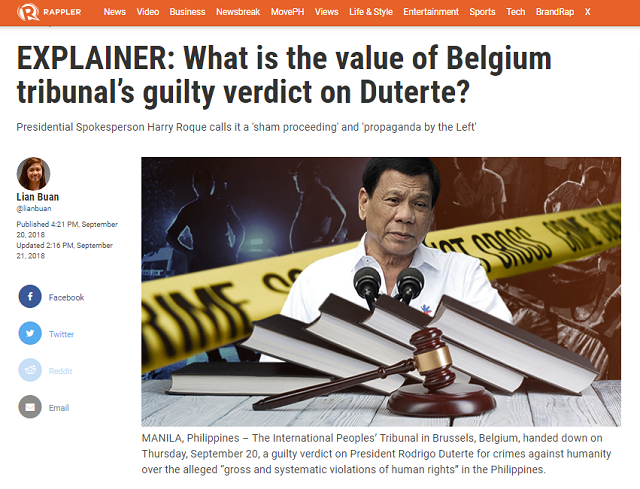People’s Tribunals: Rappler Explains Why They Matter

Screengrab from Rappler.
THE BELGIUM-BASED International People’s Tribunal on September 20 handed down a guilty verdict on President Rodrigo Duterte for “gross and systematic violations of human rights” during his bloody “war on drugs” and martial law in Mindanao. Presidential Spokesperson Harry Roque dismissed the decision, calling it a “sham” with “no official sanction.” He added that the tribunal “appears to be a propaganda body of the international Left.”
CMFR cheers online news site Rappler for explaining what the tribunal is and why its guilty verdict on Duterte matters, which in effect challenged Roque’s claims.
In its September 20 “EXPLAINER: What is the value of Belgium tribunal’s guilty verdict on Duterte?,” Rappler interviewed Filipino lawyer Emerlynne Gil, Senior International Legal Adviser of the International Commission of Jurists for Southeast Asia, who said people’s tribunals “do not have legal authority, but many of them are viewed with some credibility because of the civil society organizations convening them and the individuals invited to preside over them.”
Rappler cited as an example the tribunal assembled by mathematician, philosopher and Nobel peace prize laureate Bertrand Russell and presided over by noted author and philosopher Jean Paul Sartre in the 1960s. The tribunal found the United States guilty of genocide in Vietnam, and was credited with helping increase pressure on then US president Lyndon Johnson to end the US war in the Southeast Asian country.
Rappler added that “One of the jurors in the Belgium tribunal that found Duterte guilty is Atlanta-based human rights lawyer Azadeh Shahshahani, whose recent work involves cases of immigrants in the crackdown of the Trump administration.”
But if the decision is not legally binding, why does it matter? Rappler also quoted the statement of Edre Olalia, president of the National Union of People’s Lawyers: “Its biggest value is its strong moral persuasion and political push that would complement the overall efforts from all sources in the ultimate search for justice.”
Janet Anderson, editor of Justice Tribune, said people’s tribunals “serve a purpose, which is to publicize a specific point of view or information that isn’t making it into the mainstream. They also provide a rallying point for supporters.”
Rappler recalled that while Duterte withdrew Philippine membership in the International Criminal Court (ICC), the legality of which is still being discussed by the Supreme Court, ICC Prosecutor Fatou Bensouda has already begun a preliminary examination into the drug war killings, and will be given a copy of the Tribunal’s findings. It could contribute to the results of Bensouda’s investigation.
Leave a Reply